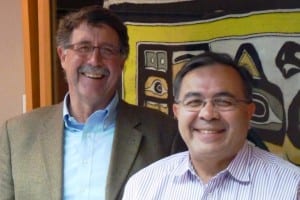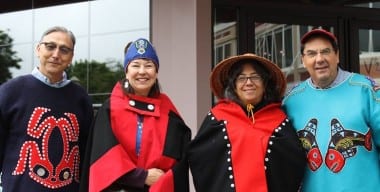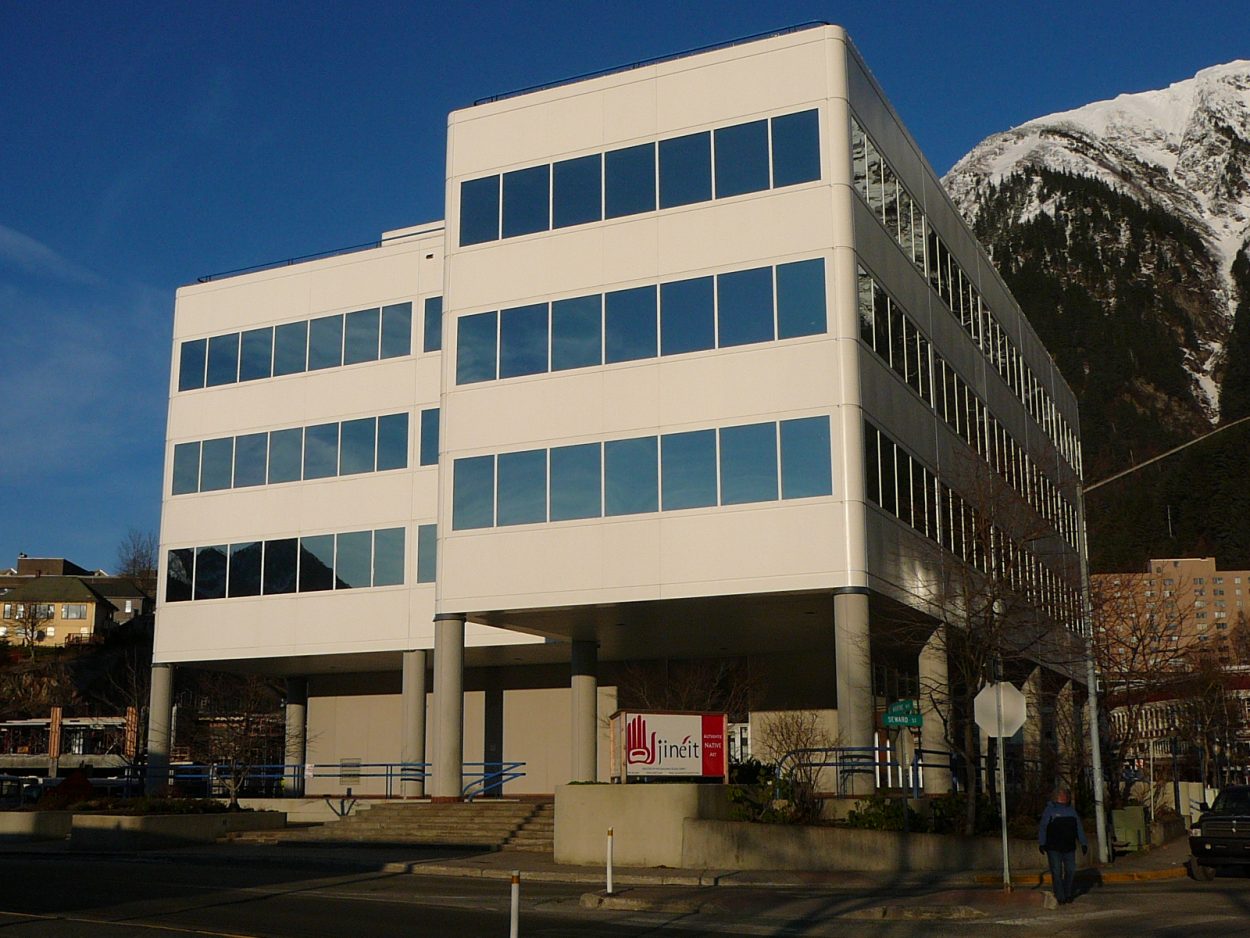
Sealaska VP Rick Harris and CEO Chris McNeil pose at the corporation’s board room. (Ed Schoenfeld/CoastAlaska)
Sealaska holds its annual shareholders’ meeting Saturday near Seattle. A new CEO will take over, as will a new board chairman or woman. And, at least one new board member will be seated.
All will face the challenges of a new economic reality. The Juneau-based regional Native corporation has been losing money and plans for recovery are somewhat uncertain.
Sealaska recently told its about 22,000 shareholders about its financial problems.
The corporation’s annual report showed operational losses of about $57 million last year. Revenues from investments and other sources brought that down around $35 million, but it’s still a lot of money.
Outgoing CEO Chris McNeil Jr. says Sealaska is doing fine. It has a three-point plan to bounce back.
“One, of course, is achieving our land entitlement before Congress. The second is making one or more highly profitable acquisitions in 2015. And then also, it would have to significantly increase its federal contracting with higher margins.”
The first is controversial federal legislation turning 70,000 to 80,000 acres of Tongass National Forest timberland over to the corporation.

4 Shareholders for Sealaska slate members Ross Soboleff, Margaret Nelson, Karen Taug and Carlton Smith pose in their regalia. (Courtesy Lucy Nelson)
It’s stalled in Congress. But if it’s passed, it will allow Sealaska to reinvigorate its shrunken logging subsidiary, once the corporation’s economic powerhouse.
Rick Harris is executive vice president of the corporation.
“We will be effectively running out of timber by the end of this year or sometime early in 2015,” Harris says.
Some of the targeted timberlands have high-value, old-growth forest. Others have, or will have, second- or young- growth trees big enough to fell and sell.
Harris says Sealaska is developing markets for those smaller trees, which already make up a fifth of timber sales.
“We’re working with the customer, we’re working with them to identify the supply we have, both for mature timber and second growth. And then helping build a plan, with our customers, so we will be able to supply their needs and that they have the mills that are capable of handling the type of wood that we can deliver,” Harris says.
Carlton Smith is one of four business-oriented shareholders running for the board as a slate.
“The board has struggled with replacing timber income. And we’ve had 20 years to plan for this,” Smith says.
He says Sealaska would do better getting involved in Alaska’s oil and gas industry and helping shareholders find employment there.
One way, he says, is to join other Native corporations campaigning against repealing the state’s oil and gas tax structure.
“We need to make a commitment to the future of Sealaska’s involvement in Alaska commerce. And that takes place in Anchorage,” Smith says.
Smith wants the corporation to open an office in the state’s largest city.
Karen Taug, another member of the shareholders slate, says it’s time to close or at least move Sealaska’s office in Bellevue, Wash. That’s the home of several subsidiaries, as well as the CEO’s main office.
“They could very well pay rent somewhere else at a much cheaper rate, rather than in a high-rent area of Bellevue. Q: Does it seem to you that that was created so Chris McNeil could live and work down south? A: Yes,” Taug says.
Corporate officials won’t give many details of the second part of their recovery plan, to buy one or several new, profitable business. That’s because it’s still being developed.
But McNeil says they’re considering areas that could employ shareholders in Southeast Alaska or the Pacific Northwest.
“We’ve taken another look and will continue to look in the fisheries sectors,” McNeil says.
Other areas include organic foods and expanded mariculture.
Sealaska’s already backing small, tribally-owned oyster farms. VP Harris says it creates businesses that take a realistic approach to village employment.
“Jobs that are the kind of thing people that want to do. And it’s consistent with the way they live their lives, instead of us coming and saying you have to change the way you live in order to have a job. We’re saying, let’s create jobs that meet your needs,” Harris says.
Shellfish farming is part of Sealaska’s Haa Aani division, which focuses on job development within Southeast.
But Smith and some other critics say that’s not where to look if you’re trying to boost corporate profits.
“I don’t know how a company that’s not making money by itself can be generating economic development elsewhere. And even though it theoretically does touch the lives of our shareholders, it certainly would not be the No. 1 priority at the moment,” Smith says.
Corporate officials say Sealaska needs to try to get more leverage out of government contracting.
But contracting is part of the corporation’s problems. About $26 million was lost when that subsidiary badly underestimated two federal construction projects in Hawaii.
The independent slate’s Ross Soboleff also wants to lower costs by reducing pay and bonuses for board members and top managers.
“My personal opinion about the board compensation now is it’s high. And when the top levels of your company tighten their belts and cut their own expenses, it sets a very important precedent and the tone of the company,” Soboleff says.
Soboleff, Taug and Smith are three of 13 candidates running for Sealaska’s board. Their slate also has a fourth member, Margaret Nelson.
Three board incumbents are seeking re-election: Sidney Edenshaw, Ed Thomas and Rosita Worl.
Other candidates running independently are Myrna Gardner, Mick Beasley, Michelle McConkey, Will Micklin, Edward Sarabia Jr. and Ralph Wolfe.
CEO McNeil will officially retire at the annual meeting. Treasurer and chief investment officer Anthony Mallott will take his place.






